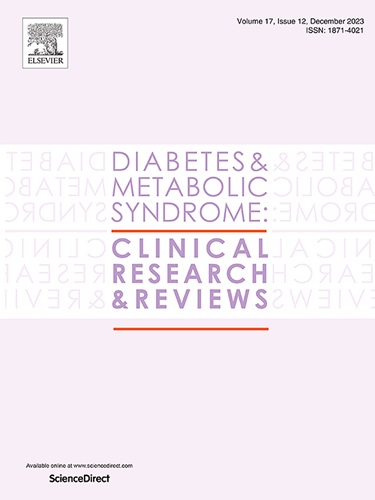糖尿病患者术前口服碳水化合物负荷的临床有效性和安全性:系统综述
IF 3.4
Q1 ENDOCRINOLOGY & METABOLISM
Diabetes & Metabolic Syndrome-Clinical Research & Reviews
Pub Date : 2024-10-01
DOI:10.1016/j.dsx.2024.103140
引用次数: 0
摘要
背景糖尿病患者术前口服碳水化合物(POC)的有效性和安全性仍存在争议。方法我们系统回顾了在糖尿病成人择期手术中比较 POC 与禁食或安慰剂的研究,重点关注胃容量、术后并发症、住院时间和血糖控制。在控制良好的 2 型糖尿病患者中,POC 不会明显增加胃容量或吸入风险。对围术期血糖控制的影响各不相同。POC 提高了患者的舒适度,减少了妊娠糖尿病患者术前低血糖的发生。有限的证据表明,POC 对心脏手术患者有潜在的益处。结论 POC 对控制良好的 2 型糖尿病患者是安全的,可提高舒适度并减少术前低血糖,同时不会增加吸入风险。然而,它对血糖控制和术后效果的影响各不相同。个性化方法至关重要,尤其是对于控制不佳的糖尿病患者。本文章由计算机程序翻译,如有差异,请以英文原文为准。
Clinical effectiveness and safety of preoperative oral carbohydrate loading in patients with diabetes: A systematic review
Background
The effectiveness and safety of preoperative oral carbohydrate (POC) for people with diabetes remain controversial.
Methods
We systematically reviewed studies comparing POC to fasting or placebo in elective surgery for diabetic adults, focusing on gastric volume, postoperative complications, hospital stay, and glycemic control.
Results
Fourteen studies (n = 1870 patients) were included. POC did not significantly increase gastric volume or aspiration risk in well-controlled type 2 diabetes. Effects on perioperative glucose control varied. POC improved patient comfort and reduced preoperative hypoglycemia in gestational diabetes. Limited evidence suggested potential benefits in cardiac surgery patients.
Conclusion
POC is safe for well-controlled type 2 diabetics, enhancing comfort and reducing preoperative hypoglycemia without increasing aspiration risk. However, its effects on glucose control and postoperative outcomes vary. Personalized approaches are crucial, particularly for poorly controlled diabetes.
求助全文
通过发布文献求助,成功后即可免费获取论文全文。
去求助
来源期刊

Diabetes & Metabolic Syndrome-Clinical Research & Reviews
ENDOCRINOLOGY & METABOLISM-
CiteScore
22.90
自引率
2.00%
发文量
248
审稿时长
51 days
期刊介绍:
Diabetes and Metabolic Syndrome: Clinical Research and Reviews is the official journal of DiabetesIndia. It aims to provide a global platform for healthcare professionals, diabetes educators, and other stakeholders to submit their research on diabetes care.
Types of Publications:
Diabetes and Metabolic Syndrome: Clinical Research and Reviews publishes peer-reviewed original articles, reviews, short communications, case reports, letters to the Editor, and expert comments. Reviews and mini-reviews are particularly welcomed for areas within endocrinology undergoing rapid changes.
 求助内容:
求助内容: 应助结果提醒方式:
应助结果提醒方式:


